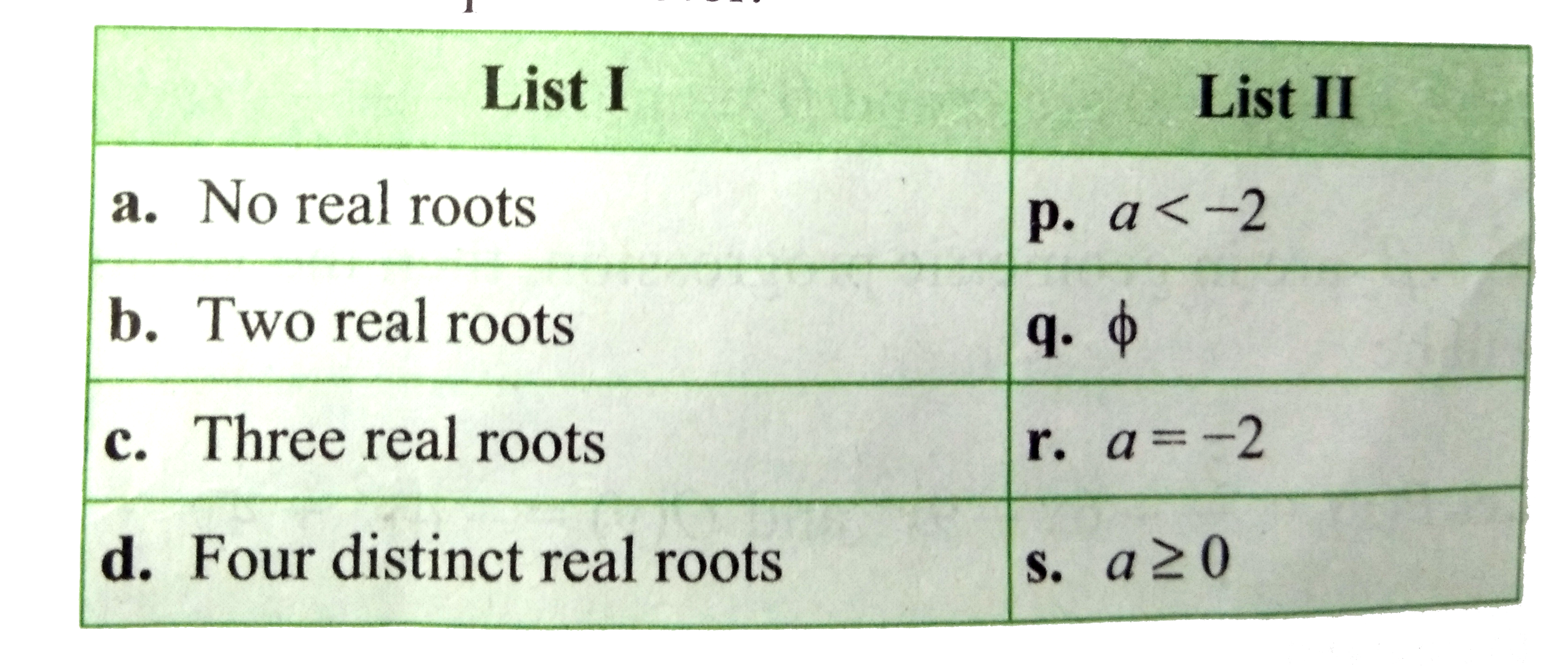If are the roots of the quadratic equation , then which of the following expression will be the symmetric function of roots a. b. c. d. Solution in Bengali
The correct Answer is:1,2,4
Symmetric functions are those which do not change by
interc
Topper's Solved these Questions
- THEORY OF EQUATIONSBOOK - CENGAGE PUBLICATIONCHAPTER - THEORY OF EQUATIONSEXERCISE - Linked Comprechension Type
37 Videos
- THEORY OF EQUATIONSBOOK - CENGAGE PUBLICATIONCHAPTER - THEORY OF EQUATIONSEXERCISE - MATRIX MATCH TYPE
6 Videos
- THEORY OF EQUATIONSBOOK - CENGAGE PUBLICATIONCHAPTER - THEORY OF EQUATIONSEXERCISE - Single Correct Answer Type : Exercise
89 Videos
- STRAIGHT LINESBOOK - CENGAGE PUBLICATIONCHAPTER - STRAIGHT LINESEXERCISE - ARCHIVES (NUMERICAL VALUE TYPE)
1 Videos
- THREE DIMENSIONAL GEOMETRYBOOK - CENGAGE PUBLICATIONCHAPTER - THREE DIMENSIONAL GEOMETRYEXERCISE - All Questions
291 Videos
Similar Questions
Consider an unknow polynomial which divided by (x−3) and (x−4) leaves remainder 2 and 1, respectively. Let R(x) be the remainder when this polynomial is divided by (x−3)(x−4).
If equations R(x)=x2+ax+1 has two distint real roots, then exhaustive values of a are.
View SolutionMatch the following for the equation x2+a|x|+1=0 where, a is a parameter.

View SolutionThe value of expression x4−8x3+18x2−8x+2 when x=2+√3
View SolutionFor a point P in the plane, let d1(P)andd2(P) be the distances of the point P from the lines x−y=0andx+y=0 respectively. The area of the region R consisting of all points P lying in the first quadrant of the plane and satisfying 2≤d1(P)+d2(P)≤4, is
View SolutionFind the angle between the line whose direction cosines are given by l+m+n=0andl2+m2−n2=0.
View SolutionIf α,β are the roots of the quadratic equation ax2+bx=c=0 , then which of the following expression will be the symmetric function of roots a.∣∣∣log(αβ)∣∣∣ b. α2β5+β2α5 c. tan(α−β) d. (log(1α))2+(logβ)2
View SolutionIf alpha and beta(alpha
View SolutionGiven that (log)px=α and(log)qx=β, then value of equals- a.αββ−α b. β−ααβ c.α−βαβ d. αβα−β
View SolutionIF α,β are the roots of x2−p(x+1)−c=0 then α2+2α+1α2+2α+c+β2+2β+1β2+2β+c=
View SolutionIf α,β are the roots of x2−p(x+1)−c=0 then α2+2α+aα2+2α+c+β2+2β+1β2+2β+1=
View SolutionIf α,β are the roots of the quadratic equation ax2+bx+c=0 , then which of the following expression will be the symmetric function of roots a. ∣∣∣log(αβ)∣∣∣ b. α2β5+β2α5 c. tan(α−β) d. (log(1α))2+(logβ)2
View SolutionIf alpha and beta are the roots of x^2 - p (x+1) - c = 0 , then the value of (alpha^2 + 2alpha+1)/(alpha^2 +2 alpha + c) + (beta^2 + 2beta + 1)/(beta^2 + 2beta + c)
View SolutionIf α,β are roots of the equation x2−p(x+1)−q=0, the value of α2+2α+1α2+2α+q+β2+2β+1β2+2β+q is
View SolutionIf αandβ are the roots of the equation x2−3x+2=0, Find the quadratic equation whose roots are −αand−β:
View SolutionIf alpha and beta are the roots of x^2 - p (x+1) - c = 0 , then the value of (alpha^2 + 2alpha+1)/(alpha^2 +2 alpha + c) + (beta^2 + 2beta + 1)/(beta^2 + 2beta + c)
View SolutionIf α,β are the roots of the quadratic equation x2+bx−c=0, the equation whose roots are b and c, is a. x2+αx−β=0 b. x2−[(α+β)+αβ]x−αβ(α+β)=0 c. x2+[(α+β)+αβ]x+αβ(α+β)=0 d. x2+[(α+β)+αβ)]x−αβ(α+β)=0
View Solution
